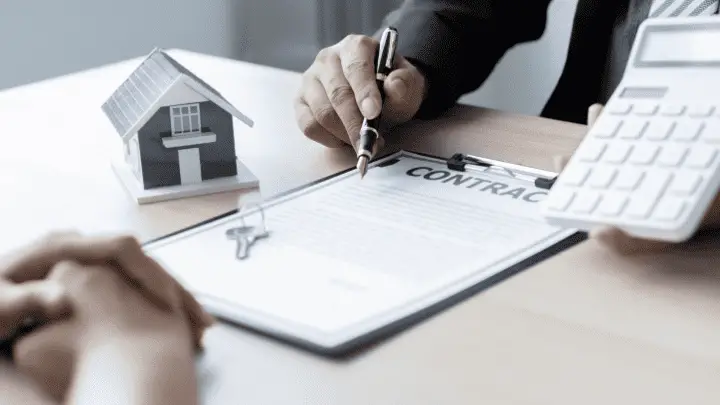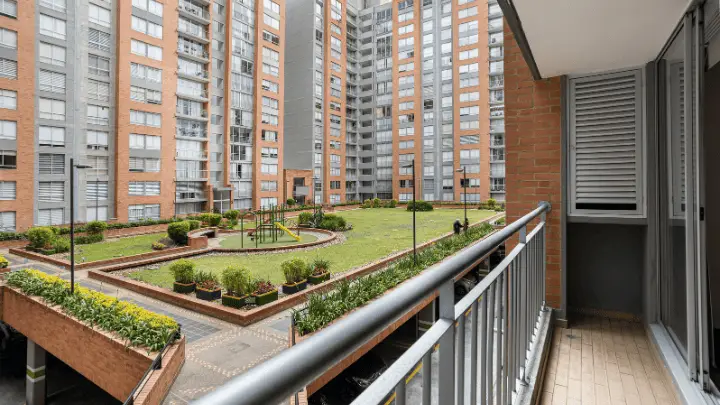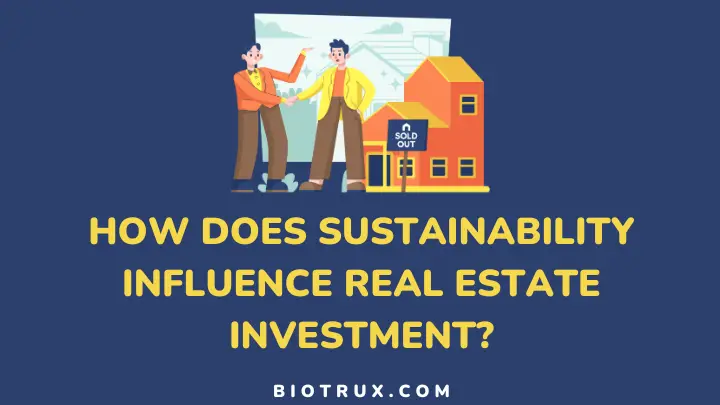Welcome to the intersection of profit and the planet! In the dynamic world of real estate investment, sustainability is a priority. And it’s not just about bricks and mortar; it’s about building a future where sustainability and financial success go hand in hand.
Whether you’re a seasoned investor or dipping your toes into real estate for the first time, understanding how sustainability influences your investments is crucial. Staying ahead of the curve requires this knowledge.
In this enlightening article, you’ll explore the synergies between sustainability and real estate investment. You’ll also learn more about unraveling the secrets behind eco-friendly properties.
These properties contribute to a healthier planet and pave the way for a more robust and lucrative investment portfolio. So, prepare for a green adventure where conscious choices meet sound financial decisions.
Sustainability’s Role in Real Estate
Sustainability has become a powerful force for change in the constantly changing world of real estate investment. Investors are recognizing the immense potential and financial gains associated with eco-friendly properties.
Sustainable real estate aligns with global environmental goals and offers a lucrative avenue for long-term financial growth. The demand for green spaces is rising, making sustainable properties an attractive investment.
It’s clear that embracing eco-friendly practices in real estate is not just a choice; it’s a proactive move towards a greener, more profitable future.
Building a sustainable portfolio
Creating a sustainable portfolio is crucial for long-term success in real estate investing. Diversifying into eco-friendly properties aligns with global sustainability goals and presents a roadmap to long-term financial prosperity.
Investors keen on weathering market fluctuations are increasingly drawn to sustainable real estate’s resilience and potential risk mitigation. The options for a green portfolio range from renewable energy projects to environmentally conscious developments.
This shift isn’t just about environmental responsibility; it’s a calculated move towards a robust, resilient, and financially rewarding real estate investment future.
Eco-friendly technologies transforming real estate
Technology is a powerful force reshaping real estate investment, and sustainability lies at its core. The integration of eco-friendly technologies is transforming traditional real estate practices.
From smart urban planning to houses with solar energy, these technologies reduce environmental impact and enhance the overall value of real estate investments. Investors navigating the green revolution are drawn to properties with the latest sustainable technologies, ensuring energy efficiency and lower operational costs.
We are witnessing a technological revolution in all ramifications. Hence, it becomes clear that the synergy between sustainability and real estate is not just a trend; it’s a blueprint for a greener and more profitable investment.
Environmental Impact and Financial Returns

The nexus between sustainability and property value
The link between sustainability and property value in real estate investment is a defining factor shaping decision-making. Sustainable features not only contribute to a property’s aesthetic appeal but also have a direct impact on its market value.
The growing demand for eco-friendly living spaces amplifies the financial returns associated with sustainable real estate investments. As environmental consciousness rises, investors recognize that green attributes contribute to a property’s long-term appreciation.
Eco-friendly practices align with global environmental targets while serving as a lucrative strategy to secure robust financial returns in a constantly changing market. This leads to converging sustainability and property value in a dynamic interaction.
Energy efficiency and cost savings
In real estate investment, the union of energy efficiency and cost considerations is pivotal in shaping both environmental impact and financial returns.
Sustainable practices focused on reducing energy consumption contribute to a greener footprint and substantial cost savings for property owners. The financial advantages of energy-efficient structures extend beyond reduced operational expenses, positively influencing the overall valuation of a property.
Investors navigating the landscape of sustainability in real estate have discovered a winning formula: the symbiotic relationship between energy efficiency and cost. This formula promises environmental stewardship and a pathway to long-term financial prosperity.
Navigating green regulatory compliance
Understanding and navigating green regulatory compliance is paramount for success in the dynamic realm of real estate investment. As sustainability takes center stage, adherence to environmental standards becomes a pivotal factor influencing property value and financial returns.
Investors navigating the green landscape must align their strategies with evolving regulations, ensuring their real estate portfolio meets eco-friendly benchmarks. Compliance safeguards against potential legal issues and enhances the market appeal, contributing to increased property values.
Mastering green regulatory compliance is essential in this era where sustainability is a driving force. It’s a strategic move toward a resilient and financially rewarding real estate investment future.
Sustainable Practices Shaping the Future of Real Estate Investment

In the fast-evolving landscape of real estate, sustainability isn’t just a buzzword; it’s a transformative force driving investment decisions. Here are a few sustainable practices reshaping the future of real estate investment:
- Green architectural designs: Innovative architect’s designs prioritize sustainability without compromising aesthetics. Designs that minimize environmental impact while maximizing visual appeal are becoming instrumental in attracting environmentally conscious investors.
- Eco-friendly construction materials: The shift towards sustainable construction materials, including recycled and eco-friendly alternatives, is gaining momentum. While these materials may have a slightly higher upfront cost, their long-term benefits contribute to cost-effectiveness and durability.
- Energy-efficient technologies: Integrating smart technologies in real estate, such as energy-efficient HVAC systems and smart meters, reduces environmental impact and leads to substantial cost savings for property owners.
- Renewable energy integration: Real estate projects increasingly incorporate renewable energy sources like solar panels. This aligns with sustainability goals and positions properties as energy-independent, contributing to long-term financial gains.
- Green certification and compliance: Investors prioritize properties with green certifications, ensuring compliance with environmental standards. Adhering to these certifications reflects environmental responsibility and enhances market appeal, positively impacting property values.
Embracing these sustainable practices isn’t just about meeting environmental goals; it’s a strategic move toward building a resilient, future-proof real estate portfolio. Integrating sustainable practices into real estate investment is crucial for shaping a greener future.
FAQs
How does sustainability impact real estate values?
Sustainability enhances property values by increasing appeal and long-term appreciation. Green features attract environmentally conscious buyers, positively influencing market demand.
Are sustainable real estate investments riskier?
Contrary to common belief, sustainable real estate investments often mitigate risks. Diversification, cost savings, and regulatory compliance contribute to a more resilient portfolio.
What role do energy-efficient technologies play in sustainable real estate?
Energy-efficient technologies reduce environmental impact. It also leads to significant cost savings for property owners, making them a crucial component of sustainable real estate.
How does regulatory compliance affect real estate investments?
Adherence to green building standards is essential. Non-compliance can lead to depreciated property values and limited market appeal, emphasizing the importance of staying green-compliant.
Can sustainable architectural designs be aesthetically appealing?
Yes. Innovative architectural designs prioritize sustainability without compromising aesthetics. Discover how eco-friendly designs contribute to the visual appeal of sustainable properties.
Are sustainable construction materials cost-effective?
Sustainable construction materials may cost more upfront, but their energy efficiency and durability benefits can lead to cost savings over time.
Embrace the Green Future: Your Sustainable Real Estate Journey
As I end this exploration of the influence of sustainability on real estate, remember that it’s more than a trend; it’s a blueprint for a successful future. The synergy between conscious choices and real estate investments isn’t a fleeting notion; it’s a dynamic force shaping the industry.
The green revolution in real estate is your pathway to resilience and prosperity, whether you’re a seasoned investor or a newcomer enticed by eco-friendly opportunities.
As you embark on your next investment venture, envision a world where sustainability is a smart strategy, a powerful investment, and a promise for a greener, more profitable tomorrow.
In this world, sustainability is not just a choice but a necessity. It is the only way to ensure a healthy planet and a prosperous future for all. Cheers to a future where every brick laid is a step towards a sustainable and prosperous real estate landscape.
You can also find out if the government should enforce sustainable living.
Thanks for reading.

